The Songhai Empire: The Golden Medieval African Civilization
The Great African Empire from the 15th and 16th Century with a Legacy of Greatness, Grandeur, Beauty, and Sophistication

The Songhai Empire (1464-1591) was the largest empire to emerge in West Africa. The capital of the Songhai Empire was Gao, which was located on the Niger River. This location was perfect for trading gold, kola, nuts, cloth, salt, and slaves for cowries (cowries are marine mollusks that was formally used as money in parts of Africa).
Technology was also present in Songhai with advancement tools and weapons, which meant larger buildings and conquering surrounding cities. Songhai was so large that it reached to the Atlantic Ocean to what is now Northwest Nigeria and central Niger. By 1500, Songhai covered 1.4 million square kilometers.
Many African empire’s fell victim to invading forces and internal disputes. For instance, the empire of Ghana came into power during the 7th-13th centuries. The empire of Mali conquered Ghana and came into power during the 12th-16th centuries, and Songhai conquered Mali and came into power during the 15th and 16th centuries.
Prominent King's of the Songhai Empire
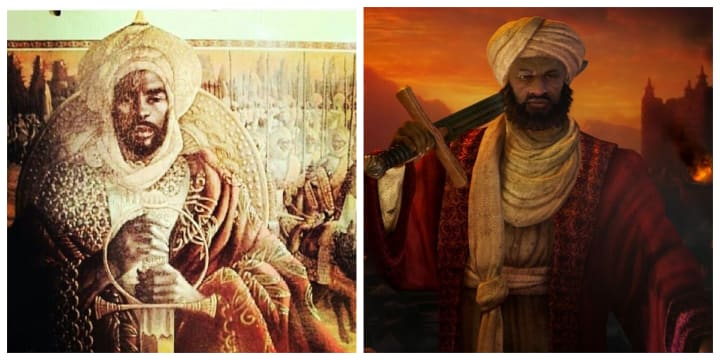
Sonni Ali (Left) and Mohammad Toure (Right)
One of the most prominent kings of Songhai was Sonni Ali, a military commander who conquered many of Songhai’s states during his short reign from 1464-1492. He led a powerful army and navy, which gave him a reputation of being a ruthless commander.
Ali died in 1492 from downing in the Niger River. After Ali’s death, his son ruled and after three years, Mohammad Toure took the throne for himself.
Songhai Oral tradition records indicated that Sonni Ali was a righteous ruler of a mighty empire.
After the reign of Sonni Ali, Mohammad Toure a.k.a. Askia The Great, a devout Muslim, became king and new ruler of the Songhai Empire, but he was different from Sooni Ali. For example, instead of being a tyrant like Ali, Askia The Great was more poised, organized, and a statesman. He divided Songhai into provinces and placed them under a governor. He also created a director of finance, justice, and agriculture.
Askia The Great built numerous schools in Songhai, and expanded Sankore University in Timbuktu. His empire was also strengthened by cultural and political ties with the rest of the Muslim world. He encouraged immigrating scholars and skilled workers from Arabia, Morocco, Egypt, and Muslim Spain. Trade policies introduced by Askia The Great also increased trade with foreigners from Europe and Asia.
Askia The Great’s reign ended when his three sons deposed him when he became old and blind. He laid a solid foundation for the Songhai Empire, which allowed it to survive numerous struggles until it fell to the Moroccan invasion of 1591.
Songhai Conquering Timbuktu and Djenne: Art, Culture, and Literature
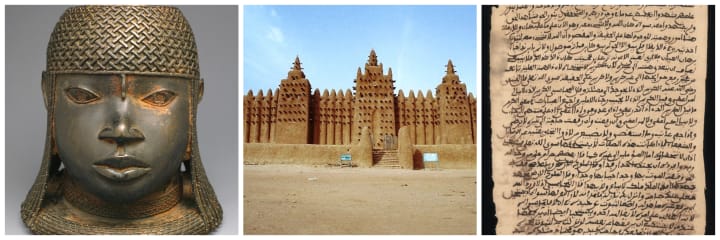
The Songhai city of Timbuktu since the 14th century was a place of mystery in the imagination of western Africa. Timbuktu became an unparalleled city of scholarship, learning, and trade.
Timbuktu’s Sankore Mosque was the university of West Africa for Muslims. Aspirations for scholars at the time wanted to study in Timbuktu because it was equivalent to earning a PhD. The heart of Timbuktu’s intellectual life was its libraries, because between the 14th and 17th centuries hundreds of thousands of books were acquired, mostly written by African scholars working within the city.
After a seven-year siege, the Songhai Empire captured the great city of Jenne (now known as Djenne). The city fell under Ali’s reign after a political marriage between himself and Djenne’s Queen. Conquering Djenne meant dominance over a region of the Mali Empire, and this also meant a start of a new legacy for the Songhai people.
After conquering Timbuktu and Djenne, the Songhai Empire acquired a lot of wealth. People visited both cities to trade gold and salt, and along with taxes, the Songhai Empire became a source of wealth.
The art of the Songhai Empire was unique and creative because the people expressed themselves through sculptures, dances, sports, books, music, and clothing. The buildings were also innovative because they were made of stone with many African and Islamic features.
Was there slavery in Medieval Africa?
During the golden age of medieval African civilizations, Africans experienced slavery in Africa in different forms such as debt slavery, military slavery, criminal slavery, and the enslavement of war captives. Plantation slavery also occurred on the east coast of Africa and some parts of West Africa.
The Africans treated their slaves like an extended member of the family, which meant they were treated with a certain level of humanity.
Africans did sell other Africans to the Europeans for slavery purposes, but the slaves were from rival tribes and not their family members or neighbors. The Africans thought the slaves sold to the Europeans were going to be treated the same way as in Africa, with a certain level of humanity.
A Dark Period in History
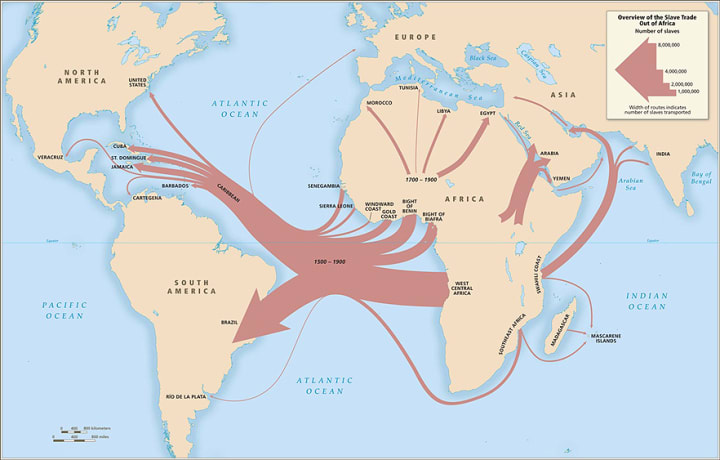
The region of West Africa that consisted of Ghana, Mali, and Songhai was known as the “gold country,” because the land produced an enormous amount of gold. Ever since the Ghana Empire came into power, the Europeans were curious about West Africa and its gold. They were also envious of the West Africans because of their immense wealth.
The transatlantic slave trade began during the 15th century when European kingdoms such as Portugal, France, Britain, Europe, and Spain wanted to expand overseas to the New World. Between 1525-1866, 12.5 million Africans were shipped to the New World, and 10.7 million survived on their way to North America, South America, and The Caribbean.
The Africans who were sold or captured for the transatlantic slave trade weren't ready for the unimaginable terror, pain, and suffering that awaited for them across the Atlantic Ocean.
For instance, when Africans arrived in North and South Carolina, the plantation owners were having problems controlling them because Africans were burning houses down and killing White folks.
The Africans were doing everything negative about being in captivity because they never saw themselves as slaves, but prisoners of war, according to Dr. Edward Robinson Jr.
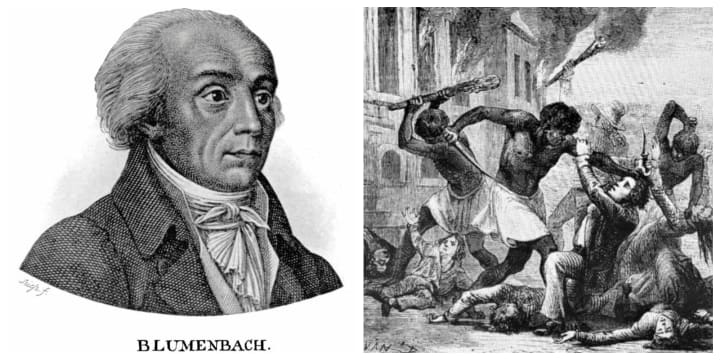
Johann Blumenbach and the impact of American slavery.
The plantation owners sought the advice of an expert in Songhai history in Germany. The expert’s name was Johann Blumenbach, and he was the head of the history department at the University of Gottingen.
Blumenbach asked the men,
“Do they know they are the Songhai people?”
The plantation owners said of course they know they come from the great Songhai Empire, and Blumenbach said,
“Well, that’s your problem because you can't let them know they came from greatness, grandeur, beauty, and sophistication. You will never be able to control them.”
The Songhai parents would tell their children they are from the Songhai Empire and the Europeans invaded them in 1591 with ships waiting to cross the Atlantic Ocean.
The plantation owners asked how could they prevent the Songhai people from knowing their history, and Blumenbach said,
“As soon as a boat load arrives, take the babies out the mother’s arms. Take the parents to a distant plantation and work them to death and raise the children to believe they came from a jungle because they won’t know the difference. How would they know? Their parents are gone.”

“This was medieval Africa at its best and at its height while Europeans were rehearsing to go into the slave trade. These Africans were winning and moving. This was Africa taking her last great walk in the sun.
They don’t want you to know when you managed nations, big nations, as big as the United States and did it exceptionally well.
Now you could understand why all of this is left out of history, because when people want to conquer you, they destroy your confidence and your historical memory." – Dr. John Henrik Clarke
About the Creator
Darryl C. Richie
Inspirational Speaker, Author and Blogger looking to inspire with my story of being a two-time cancer survivor and hip amputee, and connect the African Diaspora to their African roots via Black Consciousness.


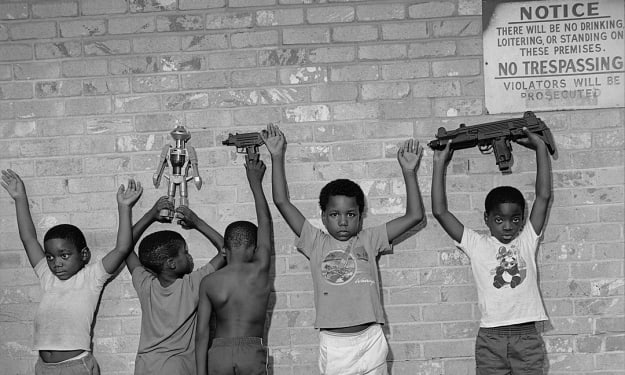



Comments
There are no comments for this story
Be the first to respond and start the conversation.